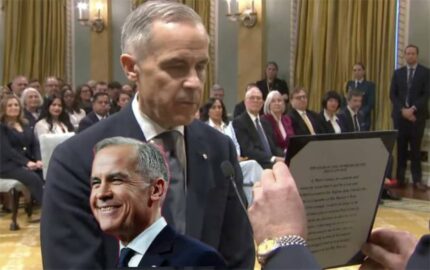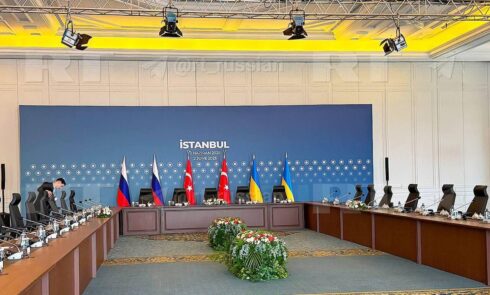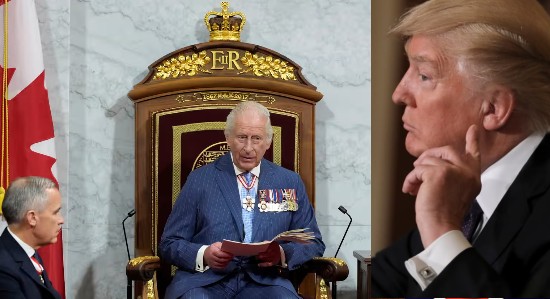Mark Carney has been sworn in as Canada’s 24th Prime Minister, taking over from Justin Trudeau, who stepped down after nearly a decade in office. Carney, a former governor of both the Bank of Canada and the Bank of England, assumes leadership at a time of heightened tensions with the United States due to a trade war initiated by President Donald Trump. In his inaugural speech, Carney pledged to defend Canadian sovereignty and navigate the country through economic uncertainty.
Mark Carney’s Bold Stand on Canadian Sovereignty
Mark Carney wasted no time in asserting his stance on Canada’s independence from the United States. In his first public remarks as prime minister, he emphatically rejected suggestions that Canada could become the 51st state of the U.S.
“We will never, in any shape or form, be part of the U.S.,” Carney declared in Ottawa, responding to Trump’s previous comments about Canada’s potential annexation. He described the notion as “crazy” and reaffirmed Canada’s distinct national identity.
Despite ongoing trade tensions, Carney expressed hope for constructive engagement with the Trump administration. “We respect the United States. We respect President Trump. But we expect respect in return,” he said, signaling a firm yet diplomatic approach to cross-border relations.
Dismantling Trudeau’s Carbon Tax Policy
In one of his first major policy moves, Carney announced the end of Canada’s consumer carbon pricing program, a controversial environmental policy introduced by Trudeau. The tax, which was intended to curb emissions, had become increasingly unpopular amid rising inflation and economic hardship.
Critics, particularly from the Conservative Party, had long argued that the carbon tax disproportionately burdened Canadian families and businesses. Carney, however, reassured the public that his administration remains committed to addressing climate change through industrial carbon pricing and other market-based solutions.
“We will continue to tackle climate change, but in a way that supports Canadian households and businesses,” Carney said during a cabinet meeting. Canadians will receive their final carbon rebate in April, marking the end of a policy that had defined Trudeau’s environmental legacy.
Economic Challenges and the U.S. Trade War
Mark Carney takes office amid a deepening trade dispute with the U.S., which has imposed sweeping tariffs on Canadian goods, including 25% on steel and aluminum and 10% on crude oil. Economists warn that if these tariffs remain in place, Canada could slide into a recession.
To counter Trump’s economic aggression, Carney has pledged to uphold Canada’s retaliatory tariffs on American goods while simultaneously seeking to diversify trade partnerships beyond North America. He is expected to travel to the UK and France next week to strengthen economic ties with European allies.
Despite the tensions, Carney remained measured in his approach, stating that Canada must “strike a balance between defending its economic interests and maintaining a strong relationship with our largest trading partner.”
New Cabinet Appointments and Election Speculation
Mark Carney has assembled a streamlined cabinet, reducing the number of ministers from Trudeau’s 37-member team to 24. Several key figures from Trudeau’s administration remain in their roles, reflecting continuity in critical areas, particularly foreign affairs and trade.
Mélanie Joly retains her role as Foreign Minister, ensuring stability in Canada’s diplomatic engagements.
Dominic LeBlanc shifts from Finance Minister to Minister of International Trade, taking charge of trade negotiations with the U.S.
François-Philippe Champagne moves from Industry Minister to Finance Minister, overseeing Canada’s economic policies.
Chrystia Freeland, Carney’s former leadership rival, returns to the cabinet as Minister of Transport and Internal Trade.
Political analysts believe Carney may call a snap election in the coming months, as he currently does not hold a seat in Parliament. While he has not confirmed the timing, he hinted at seeking a “stronger mandate for the time.”
Poilievre’s Challenge and Shifting Election Dynamics
Mark Carney’s main political rival, Conservative leader Pierre Poilievre, wasted no time in attacking the new prime minister. Speaking shortly after Carney’s swearing-in, Poilievre argued that the Liberals do not deserve another term in office.
“We’ve had nine years of Liberal rule, and what has it given us? Higher costs, more debt, and economic hardship. Canadians deserve real change,” Poilievre said. He vowed to take a tougher stance against Trump’s trade policies if elected.
Before the trade war escalated, the Conservatives held a commanding lead in the polls. However, recent surveys indicate a tightening race, with the Liberals experiencing a surge in support due to rising Canadian nationalism. A new Abacus Data poll shows the Conservatives at 38% support, down from previous highs, while the Liberals have climbed to 34%.
With an election potentially on the horizon, Mark Carney’s leadership will be put to the test as he seeks to solidify his position and guide Canada through a volatile period in its political and economic landscape
Mark Carney’s tenure as prime minister begins at a critical juncture for Canada, with economic uncertainty, trade disputes, and political challenges shaping the road ahead. His ability to navigate the U.S. trade war, implement effective economic policies, and unite his party will determine his success in the coming months. As Canada prepares for its next federal election, all eyes will be on Carney’s leadership and his ability to rally the nation behind him.














